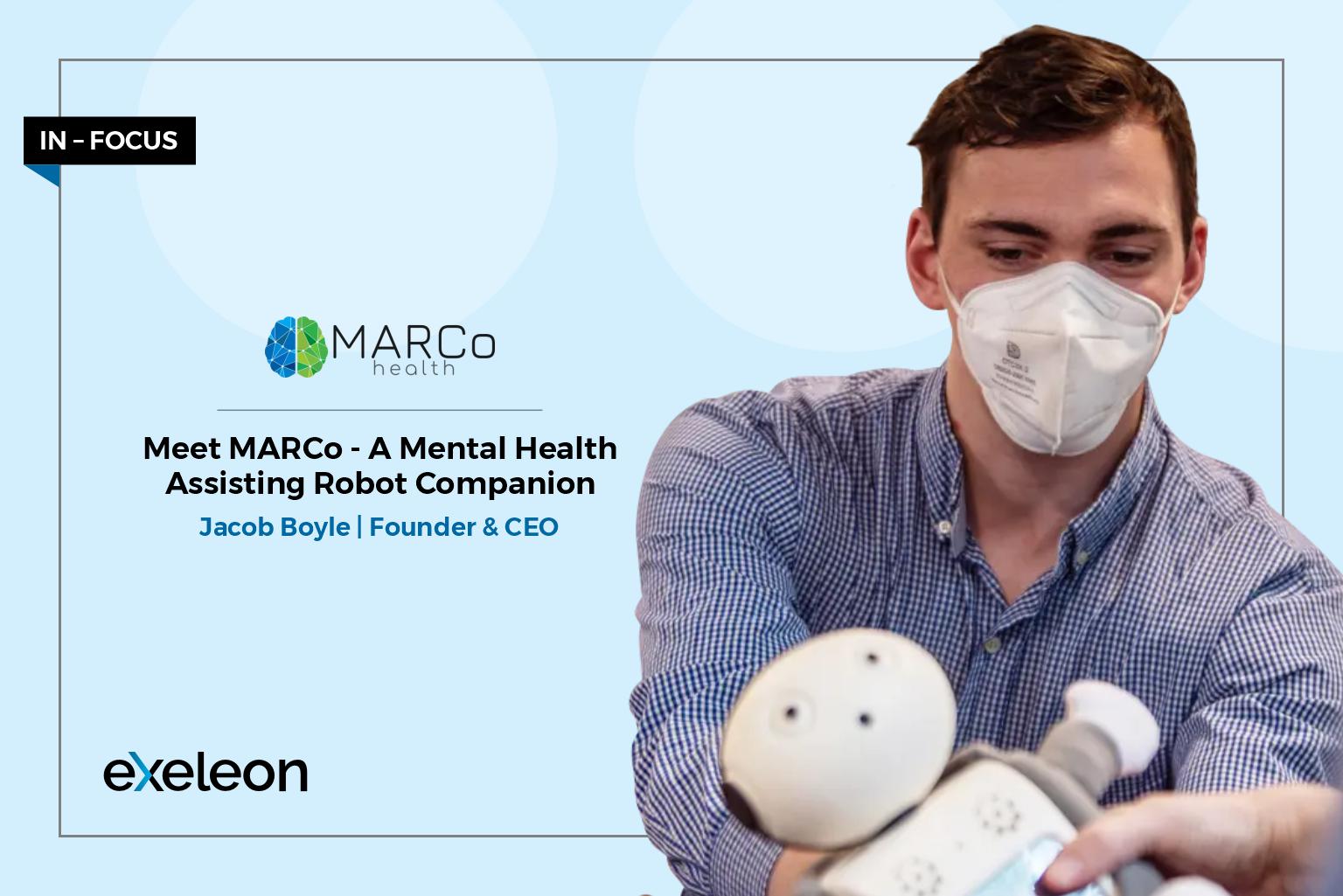
Jacob Boyle, Founder and CEO of MARCo Technologies LLC, has created a one-of-kind mental health assisting robot.
Fueled by his own struggles with mental health and inability to find proper counseling solutions, Jacob Boyle decided to change the way we address mental health struggles.
MARCo is an interactive robot that can not only help young adults and teens as an innovative, reliable, and affordable solution, but it can also help drive the industry forward by introducing new technologies and solutions.
In this Exclusive Interview, Jacob Boyle talks about mental health, entrepreneurship, and MARCo.
What is your earliest memory as an entrepreneur that you can remember?
When I was in elementary school, I had a “company” I called “Wallet Full of Businesses, Inc.” It was just me making various things – hand-drawn comic books and children’s books, cookies, clay models, etc. – and selling them to family, friends, and our neighbor Ed.
At that age, I just saw it as something fun to do and get a couple dollars out of, but looking back I realize how much of an entrepreneur’s journey I went through – pitching to my parents Shark Tank style to fund my latest venture, doing customer interviews to learn what would make my classmates be willing to buy my books, pivoting when a bigger opportunity came along, and choosing the freedom of the entrepreneurial life over a 9-5 job (i.e., chores for an allowance).
Talk to us about your personal experience with mental health and your struggle when it came to finding a helping solution.
I’ve struggled with my mental health since late middle school, early high school, primarily with depression, anxiety, and self-harm. I first noticed depressive symptoms in middle school, and started harming around sophomore year of high school, but I couldn’t understand what was going on or that these were parts of a bigger problem.
I didn’t get help until senior year of high school, and even then, it required a lot of people to notice what was going on, understand this was serious, and find the help for me. I never would have known how to navigate getting help on my own, and when I spoke to most people my age, they didn’t understand and got angry with me for the ways I was acting – there was just a lot of stigma around it at that time. And once I graduated high school, I lost access to the care I needed.
College was better, as my school had a great on campus counseling center, but once I was out of school – whether it was for a semester or post-graduation – finding external support was near impossible. I had no money, had to pay out of pocket, and got placed in months-long waitlists with no hope of getting any support when I needed it. And I wasn’t alone – most of my friends were going through similar struggles and didn’t or couldn’t get any help when they needed it most. I knew something needed to change in the way we address mental health struggles.
You created MARCo to help teens and young adults struggling with mental health. What was the innovation that went behind creating this interactive robot?
The two big innovations behind MARCo were its conversational design and its physical form factor. Work had been done before on developing chatbots for mental healthcare, but what we’ve tried to do is step beyond a simple chatbot interaction. We designed MARCo’s conversations to be long-form to mimic real human interactions.
Chatbots have had the limitation of one phrase input and one phrase output, but MARCo’s dialogues are more dynamic. If the user wants to talk to MARCo for 30 minutes straight without interruption as they rant about their day, they have that option. We’ve pushed the envelope in terms of the limits of conversational AI to make it as intelligent as possible.
Beyond that is its physical form. Whereas others in our field have taken costly, existing robots and added their own software at a significant price markup, MARCo’s hardware was designed from the ground up based on hundreds of customer interviews to make it optimal for our target users and keep the costs as low as possible to the end customer. This has taken years of design optimization and user testing.
Do you think robot-assisted therapy is the future? Can it replace traditional therapy services or stand as an alternative?
I’m a firm believer that the best technology never replaces human skills and services; it either augments them to be better than ever or fills a gap between those skills and services.
Likewise, with MARCo, we are not trying to replace any traditional therapy services but accomplish those two goals. For those currently receiving some degree of care, robot-assisted therapy can augment care to deliver better outcomes to the client, reduce wait times and gaps in care, and enable providers to deliver care in new and more efficient ways.
For those who are not receiving any degree of care, robot-assisted therapy can fill in the gaps created by lack of access, high out of pocket costs, stigma, mistrust in services, and seemingly endless wait times. This combines not to form a replacement, but a “therapeutic alliance” between traditional services and robot augmented services.
More and more people are talking and discussing about mental health in recent years. What would you attribute this change to?
COVID’s been a big item that’s shifted the conversation to be more open. It has affected everyone in some way and has created an unprecedented mental health crisis. Rates of mental illness rocketed, and typically as something becomes more common, it also becomes more normalized to talk about.
Aside from that, there’s been a big generational shift. Older generations grew up in very stigmatized times, whereas younger generations, especially Gen Z, have grown up with mental health services, groups, clubs, and media much more prevalent in their lives thanks to the hard work of service providers and advocates. As these younger generations enter the workforce and dominate social media platforms as they emerge, they are much more comfortable sharing their own experiences and stories, even if it’s anonymous, across all kinds of media.
Finally, another big shift has to do with the money. Mental health startups and unicorns have been around for years, but over the past couple years they’ve seen tons of funding pour in from VC’s and investors who see the growth potential in mental healthcare. As that money flows into these companies, it enables them to get higher profile sponsors, get their messaging out further, and drive the conversation not just about their company but about mental health in general.
Being a young entrepreneur, what would be your advice for aspiring and emerging entrepreneurs?
To me, there are two primary reasons people might become entrepreneurs. The first is that they themselves love the entrepreneurial lifestyle and all its perks and challenges and want to live it.
The second is that they have a vision of a way to make a significant impact or change on the world or some industry and the only way they see to do that is by becoming an entrepreneur to bring their vision to reality.
My advice is to know which reason you’re getting into entrepreneurship and stay true to that purpose. I got into it for the second reason – I had no intentions of getting into entrepreneurship in my life at first, but when I saw a problem with the state of mental healthcare and had a vision for how it could be better through technology, I saw starting my own business as the way to make my vision a reality. But there’s so much pressure to switch, to look for the quickest path towards personal success that it can become overwhelming.
My advice is also to stay true, no matter what, to what you want to do. Because if you don’t feel like you’re doing the right thing for you, you’re going to be miserable the whole time.
Finally, what does the future look like for MARCo? How do you plan on expanding its reach and usability?
MARCo is currently great for supporting people with their mental health, but our vision for MARCo is to help the people at highest risk in the most serious situations with it. This means a medical device MARCo for treatment of those with chronic mental illness, suffering immensely as the result of major depression and comorbid diseases.
This MARCo would be at first prescription only, but as the technology, science, and regulatory environment improve, eventually it could be something that anyone suffering from severe mental illness could get over the counter, covered by insurance as soon as they needed.
To get there, we are doing a combination of real-world tests and clinical.
Read Digital Version of the Magazine.
Visit MARCo Technologies LLC Website.










